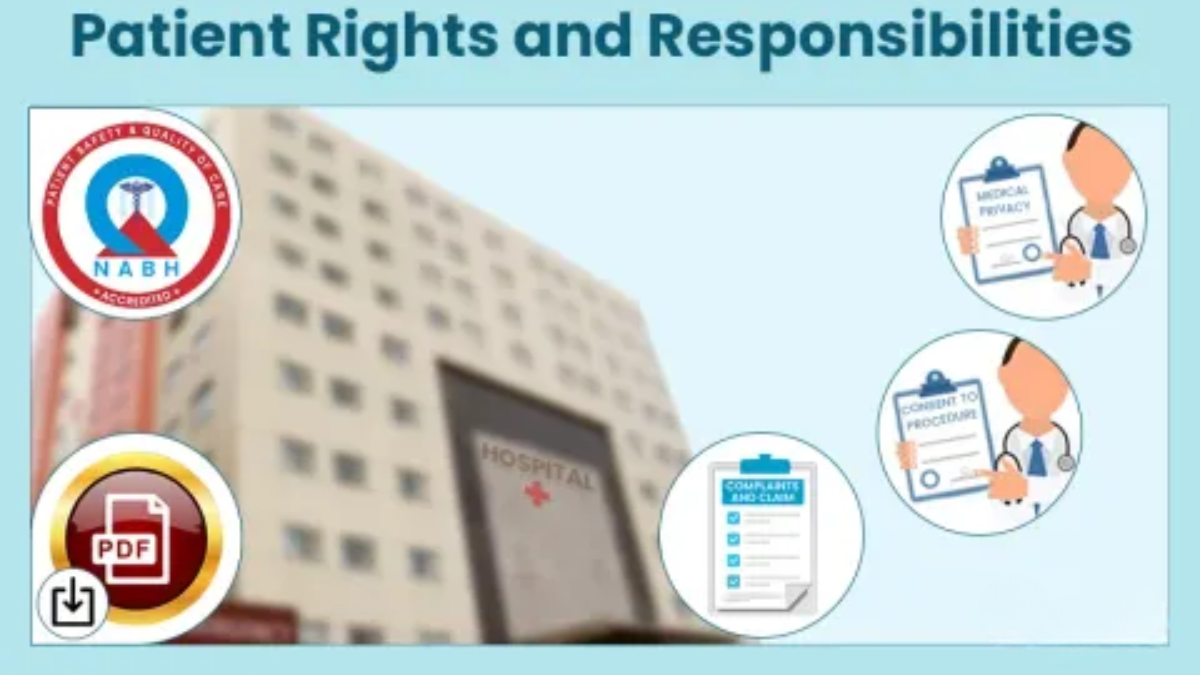Hospitals are responsible for ensuring that patients receive safe, respectful, and high-quality care. Understanding patient rights and responsibilities is essential for both patients and hospital staff. Patients have the right to be informed, to privacy, and to make decisions about their healthcare. At the same time, patients have responsibilities to follow hospital rules, provide accurate information, and respect medical staff and other patients.
Key Patient Rights in Hospitals
1. Right to Informed Consent
- Patients must receive clear information about treatments, procedures, and risks.
- Consent must be voluntary and documented.
2. Right to Privacy and Confidentiality
- Medical records are confidential.
- Doctors and staff must respect patient privacy during examinations and treatment.
3. Right to Safe and Quality Care
- Patients are entitled to receive care without negligence or avoidable harm.
- Hospitals must follow safety protocols to prevent infections and errors.
4. Right to Access Medical Records
- Patients can view their medical history, test results, and treatment plans.
- Hospitals must provide copies upon request.
5. Right to Choose Treatment and Providers
- Patients can decide whether to accept or refuse medical treatment.
- They may seek a second opinion or change doctors if necessary.
6. Right to Complain and Receive Feedback
- Hospitals should have a complaint and grievance redressal system.
- Patients’ concerns must be addressed promptly and fairly.
Key Patient Responsibilities in Hospitals
1. Providing Accurate Information
- Share complete medical history, allergies, and medications.
- Inform staff about lifestyle habits that may affect treatment.
2. Following Medical Advice
- Take medications and follow treatment plans correctly.
- Attend follow-up appointments as recommended.
3. Respecting Hospital Rules and Staff
- Adhere to visiting hours, cleanliness rules, and safety guidelines.
- Treat doctors, nurses, and other patients with respect.
4. Cooperation in Care
- Inform staff about any changes in condition promptly.
- Assist in keeping the hospital environment safe and clean.
5. Financial Responsibility
- Pay hospital bills as per agreement.
- Inform hospital about insurance or payment limitations.
Importance of Patient Rights and Responsibilities
- Builds Trust: Patients feel respected and confident in the hospital.
- Ensures Safety: Compliance with rules and protocols prevents errors.
- Improves Outcomes: Cooperation between patients and staff leads to better treatment results.
- Legal Protection: Protects patients and hospitals under healthcare laws.
- Enhances Communication: Open dialogue reduces misunderstandings.
Role of Hospitals in Ensuring Patient Rights
- Training staff on patient rights and ethics.
- Implementing privacy and consent protocols.
- Establishing feedback and complaint systems.
- Ensuring informed consent before procedures.
- Providing accessible information about hospital policies and services.
Challenges in Patient Rights and Responsibilities
- Low awareness among patients about their rights.
- Language barriers in communication.
- Overcrowding and high patient-to-staff ratio.
- Lack of proper grievance mechanisms in some hospitals.
- Non-compliance by patients leading to treatment delays.
Future of Patient Rights in Hospitals
- Digital Consent Forms: Easier and faster informed consent processes.
- Patient Portals: Access to records and test results online.
- Telemedicine Rights: Ensuring confidentiality in virtual consultations.
- Awareness Campaigns: Educating patients about their rights and duties.
- Standardized Global Protocols: Hospitals adopting international patient rights standards.
FAQs on Patient Rights and Responsibilities in Hospitals
1. What are patient rights in hospitals?
They include informed consent, privacy, safe care, access to records, and the right to complain.
2. Why are patient rights important?
They protect patients from harm, ensure transparency, and build trust.
3. What are patient responsibilities?
Providing accurate information, following medical advice, respecting staff, cooperating in care, and financial responsibilities.
4. Can patients refuse treatment?
Yes, patients have the right to accept or refuse any medical treatment.
5. How can patients access their medical records?
By requesting copies from the hospital under confidentiality protocols.
6. What happens if patient rights are violated?
Hospitals are legally accountable and must address complaints promptly.
7. Are patient rights the same worldwide?
Basic rights are similar, but specific laws may vary by country.
8. How can hospitals ensure patient privacy?
Through secure digital records, private consultations, and staff training.
9. Why is cooperation important in hospitals?
It ensures smooth treatment, reduces errors, and improves recovery outcomes.
10. How will technology improve patient rights?
Digital consent, patient portals, and telemedicine enhance transparency and access to information.

